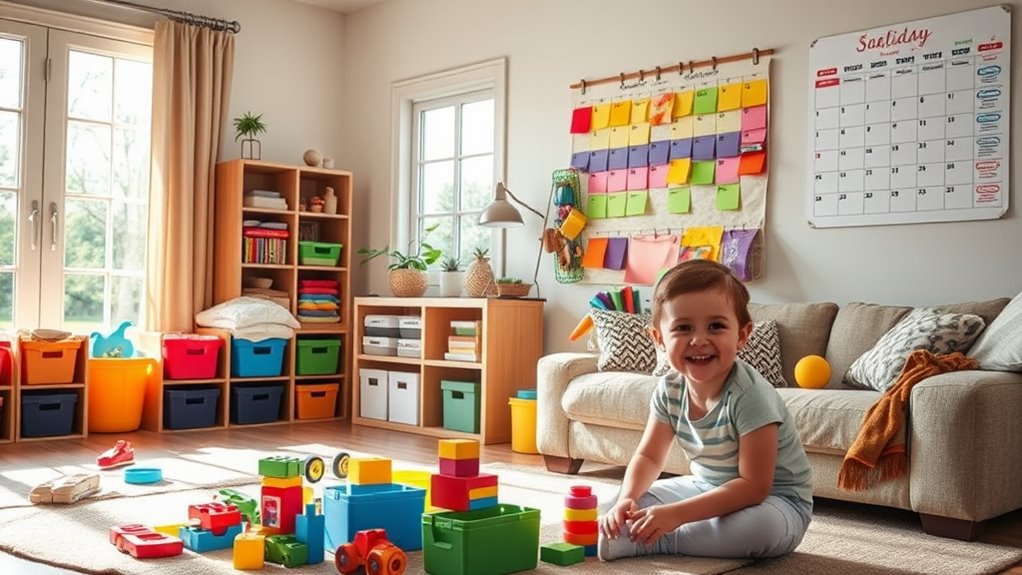Family Life Hacks That Are Saving Parents Everywhere!
You’re not alone if juggling family life feels overwhelming! Start with meal prep on weekends—batch cook soups and casseroles that freeze well, saving you time on busy weeknights. For scheduling, create a shared family calendar to keep everyone’s activities organized and hold weekly family meetings to address conflicts. Get the kids involved in chores with a fun chart and a reward system that encourages responsibility. Don’t forget creative activities to keep boredom at bay, like scavenger hunts or mini-plays. Stick around, and you’ll discover even more hacks that can lighten your parenting load!
Key Takeaways
- Batch cook meals on weekends and freeze them for quick, healthy dinners during busy weeknights.
- Utilize a shared family calendar and hold weekly meetings to synchronize schedules and prevent conflicts.
- Implement a chore chart with a reward system to encourage kids’ participation in household responsibilities.
- Engage kids with creative activities like scavenger hunts or storytelling to keep them entertained and developing skills.
- Leverage digital tools to streamline chores, scheduling, and communication for improved family organization and connectivity.
Meal Prep Made Easy
Ever wonder how some families manage to eat home-cooked meals every night without losing their minds? It’s all about meal prep, specifically batch cooking and freezer meals. Trust me, once you get the hang of it, you’ll wonder how you ever lived without this lifesaver.
Start by dedicating a few hours on the weekend for batch cooking. Choose recipes that freeze well—think soups, casseroles, or marinated proteins. While you’re chopping veggies, you’ll feel like a culinary superhero. You’ll have a stash of delicious meals ready to go, which means no more last-minute takeout runs.
When it comes to freezer meals, invest in some quality containers. Label them with the date and contents, so you don’t play the “What’s in here?” guessing game later. You’ll be amazed at how a stocked freezer can ease your weeknight stress.
Imagine walking in after a long day, knowing dinner’s already prepped. Just pop a meal in the oven, and you’ll have a wholesome family dinner in no time. With these simple strategies, you’re on your way to mastering meal prep like a pro!
Organizing Family Schedules
After you’ve got meal prep down, the next step is tackling the family schedule. You know how chaotic things can get when everyone’s got different activities, appointments, and commitments. Start by creating a family calendar that everyone can access. Whether it’s a shared Google Calendar or a good old-fashioned paper planner, having a visual representation of your week can work wonders.
Next, practice schedule synchronization. Set aside a weekly family meeting—just 15 minutes will do—to review everyone’s schedules. This helps you anticipate conflicts and make adjustments before they turn into chaos. For instance, if you see your daughter’s soccer game overlaps with your son’s piano lesson, you can sort out a carpool or swap pick-up duties ahead of time.
Don’t forget to include fun family activities in that calendar! Make sure everyone feels involved. When you take this proactive approach, you’ll find that the stress of juggling schedules diminishes, and you’ll have more quality time to spend together. Remember, organization isn’t about being rigid; it’s about creating a flexible framework that allows your family to thrive amidst the busyness of life.
Simplifying Chore Responsibilities
Keeping up with chores can feel overwhelming, but it doesn’t have to be! Start by assigning age-appropriate tasks to your kids, and consider using a chore chart to keep everyone on track. Plus, a little reward system can turn those dreaded chores into something your family actually looks forward to!
Delegate Age-Appropriate Tasks
When it comes to managing household chores, delegating age-appropriate tasks can make a world of difference. By sharing responsibilities with your kids, you’re not just lightening your load; you’re also building their sense of responsibility. Here are three practical ways to get started:
-
Toddlers (2-4 years): Little ones can help with simple tasks like sorting laundry by color or putting away toys. This not only teaches them about organization but also makes them feel involved.
-
Preschoolers (4-6 years): At this age, kids can handle basic cleaning tasks like wiping off tables or dusting low surfaces. It’s a great way to encourage task sharing while making them feel like they’re contributing to the family.
-
School-Age Kids (6+ years): Your older kids can take on more complex challenges like emptying the dishwasher or sweeping the floors. This builds their confidence and gives them a sense of accomplishment.
Implement a Chore Chart
A chore chart can be a game changer for simplifying household responsibilities and keeping everyone on the same page. You might think, “Isn’t this just another piece of paper?” But trust me, the chore chart benefits are real. It creates a clear visual tracking system that everyone can reference, reducing confusion about who does what.
Start by involving your kids in the process. Let them pick their chores and assign tasks that fit their age and abilities. This way, they feel a sense of ownership. You’ll notice that once they see their tasks laid out, they’re less likely to forget or avoid them. Plus, the satisfaction of crossing off completed chores can be surprisingly motivating!
Display the chart in a common area, like the kitchen or family room. This keeps responsibilities front and center, and it sparks conversations about what needs to be done. Your family will soon appreciate the structure and routine. And who knows? You might even find that chores become a little less daunting and a lot more collaborative. Embrace the chore chart, and watch your household run more smoothly!
Reward System for Motivation
Now that you’ve got a chore chart in place, it’s time to boost motivation with a reward system. Implementing a structured approach can make chores feel less like a drag and more like a game. By introducing reward tiers into your incentive programs, you can encourage your kids to tackle their tasks with enthusiasm.
Consider these three strategies to keep things exciting:
-
Point System: Assign points for each chore completed. Once they accumulate a certain number, they can choose a reward from a tiered list—like screen time or a special treat.
-
Surprise Rewards: Occasionally offer surprise rewards for unexpected acts of responsibility. Maybe they clean up without being asked; a little surprise can go a long way!
-
Family Fun Day: Create a tier where reaching a set goal earns a family outing. This not only motivates them to complete chores but also strengthens your family bond.
Creative Kids’ Activities
Creative kids’ activities can transform a rainy afternoon into a memorable adventure. Instead of letting the dreary weather dampen spirits, why not dive into some hands-on fun? Grab some old newspapers and let your kids unleash their artistic expression by creating collages. You’d be amazed at what they can come up with using just scissors and glue!
If the skies clear up, take the opportunity for outdoor adventures. A simple nature scavenger hunt can turn a neighborhood walk into an exciting expedition. Create a checklist of items like pine cones, interesting leaves, or even a funny-shaped rock. Kids love the thrill of searching and discovering.
Don’t overlook the power of storytelling, either. Give each child a prompt, and watch as they craft their own tales. You could even turn it into a mini-play, complete with costumes made from household items.
These activities not only keep your kids engaged but also help them develop important skills. So, the next time boredom strikes, remember: creativity is just around the corner, waiting for you to explore it together!
Efficient Grocery Shopping
After a fun-filled day of crafting and storytelling, it’s time to think about the next family meal—grocery shopping. You’ve got a busy week ahead, so let’s make this as efficient as possible. First things first, stick to a grocery budget. It’s easy to overspend when you’re distracted by all those colorful packages.
Create a shopping list before you head out. A well-planned list streamlines your trip, and trust me, it helps keep the kids focused too. Here’s how to nail it:
- Plan Meals: Decide what you’ll cook for the week. It saves you from last-minute takeout, which can wreck your budget.
- Check Inventory: Look at what you already have. This prevents duplicate purchases and waste.
- Organize Your List: Group items by category—produce, dairy, snacks. This way, you won’t find yourself zigzagging through the store.
Tech Tools for Parents
As a busy parent, juggling schedules and chores can feel overwhelming, but tech tools can make your life a whole lot easier. Smart scheduling apps help you coordinate family activities, while digital chore management systems keep everyone accountable and on track. Plus, family communication tools ensure that no one misses an important message, making your home run smoother than ever.
Smart Scheduling Apps
Juggling family schedules can feel like a high-wire act, but smart scheduling apps are here to make your life a whole lot easier. With so much going on, you need tools that help you stay organized and keep everyone on the same page. Here are three great features to look for in a scheduling app:
-
Calendar Synchronization: Choose an app that syncs seamlessly with your existing calendars. This way, you can see everyone’s commitments at a glance without the hassle of switching between different platforms.
-
Task Reminders: Set automatic reminders for appointments, school events, and even family activities. You won’t have to worry about forgetting that dentist appointment again!
-
Shared Access: Opt for an app that allows family members to easily access and update the schedule. This fosters communication and helps everyone feel involved in planning.
Whether you’re coordinating soccer practices, playdates, or family vacations, these smart scheduling apps will empower you to master your family’s busy life. Embrace the tech that works for you, and watch the chaos turn into smooth sailing!
Digital Chore Management
Keeping up with household chores can often feel like a never-ending battle, but digital chore management tools are here to change the game. Imagine a world where you can automate your chores and delegate tasks with just a few taps on your phone. That’s the beauty of chore automation.
Apps like Todoist, Cozi, or OurHome let you create digital tasks and assign them to family members, making everyone accountable. You can set reminders and due dates, so nothing slips through the cracks. For instance, if your kids usually forget to take out the trash, you can schedule it as a recurring task. When they get that notification, it’s a gentle nudge without you having to play the “nagging parent” role.
Plus, you can track progress and celebrate completed tasks together, which adds a fun twist. Integrating these tools into your daily routine not only lightens your load but also teaches your kids responsibility. So, embrace digital chore management and watch your household run more smoothly. It’s a win-win for everyone, and you’ll feel a whole lot more organized!
Family Communication Tools
When life gets busy, effective communication becomes essential for families to stay connected and organized. You might find yourself juggling schedules, but using the right tools can make a world of difference. Here are three family communication tools that can streamline your family life:
-
Communication Apps: Consider using apps like Family Organizer or Cozi. They help you share calendars, grocery lists, and reminders in one place, ensuring everyone’s on the same page.
-
Family Meetings: Regular family meetings can be game changers. Set aside time each week to discuss plans, share achievements, and address any concerns. This open dialogue fosters a sense of teamwork and keeps everyone involved.
-
Group Texting: Don’t underestimate the power of a group chat. Whether it’s a quick reminder or a fun photo, texting keeps the conversation going, even when you’re all busy.
These tools can transform how you communicate and help you master the art of family coordination. So, embrace these tech tools, and watch as your family becomes more connected and organized than ever before!
Frequently Asked Questions
How Can I Encourage Kids to Help With Chores?
Chores can feel like a burden, but they can also be fun! Create chore charts and implement reward systems. Kids love earning rewards, so make it a game to encourage their participation and responsibility.
What Are Some Quick, Healthy Meal Ideas for Busy Nights?
For those busy nights, try meal prep on weekends. Quick recipes like one pot meals or slow cooker dishes save time. Don’t forget healthy snacks and easy breakfasts. Freezer meals can be lifesavers too!
How Do I Handle Sibling Rivalry During Family Activities?
When handling sibling rivalry during family activities, try using sibling strategies like setting clear activity agreements. Encourage teamwork and celebrate their unique strengths. This way, you’ll create a more harmonious and enjoyable experience for everyone involved.
What’s the Best Way to Budget for Family Groceries?
Ever wondered how to stretch your grocery budget? Start by using grocery apps to track sales, then embrace bulk buying for essentials. You’ll be amazed at how much you can save while feeding your family!
How Can I Limit Screen Time Without Causing Tantrums?
To limit screen time without tantrums, try introducing engaging activities like arts and crafts or outdoor games. You’ll find that offering screen time alternatives keeps your kids entertained and helps them adjust more smoothly.




